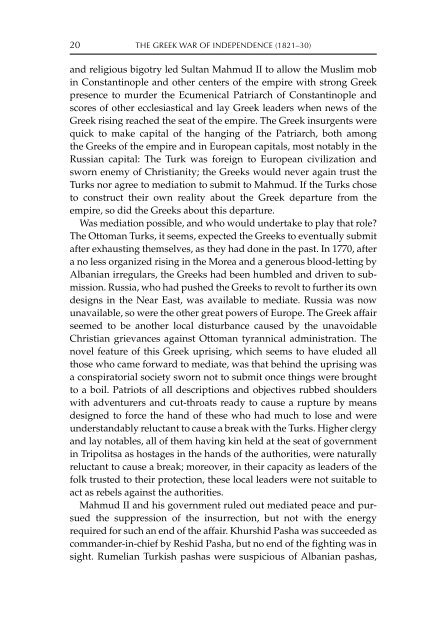MODERN GREECE: A History since 1821 - Amazon Web Services
MODERN GREECE: A History since 1821 - Amazon Web Services
MODERN GREECE: A History since 1821 - Amazon Web Services
You also want an ePaper? Increase the reach of your titles
YUMPU automatically turns print PDFs into web optimized ePapers that Google loves.
20 THE GREEK WAR OF INDEPENDENCE (<strong>1821</strong>–30)<br />
and religious bigotry led Sultan Mahmud II to allow the Muslim mob<br />
in Constantinople and other centers of the empire with strong Greek<br />
presence to murder the Ecumenical Patriarch of Constantinople and<br />
scores of other ecclesiastical and lay Greek leaders when news of the<br />
Greek rising reached the seat of the empire. The Greek insurgents were<br />
quick to make capital of the hanging of the Patriarch, both among<br />
the Greeks of the empire and in European capitals, most notably in the<br />
Russian capital: The Turk was foreign to European civilization and<br />
sworn enemy of Christianity; the Greeks would never again trust the<br />
Turks nor agree to mediation to submit to Mahmud. If the Turks chose<br />
to construct their own reality about the Greek departure from the<br />
empire, so did the Greeks about this departure.<br />
Was mediation possible, and who would undertake to play that role?<br />
The Ottoman Turks, it seems, expected the Greeks to eventually submit<br />
after exhausting themselves, as they had done in the past. In 1770, after<br />
a no less organized rising in the Morea and a generous blood-letting by<br />
Albanian irregulars, the Greeks had been humbled and driven to submission.<br />
Russia, who had pushed the Greeks to revolt to further its own<br />
designs in the Near East, was available to mediate. Russia was now<br />
unavailable, so were the other great powers of Europe. The Greek affair<br />
seemed to be another local disturbance caused by the unavoidable<br />
Christian grievances against Ottoman tyrannical administration. The<br />
novel feature of this Greek uprising, which seems to have eluded all<br />
those who came forward to mediate, was that behind the uprising was<br />
a conspiratorial society sworn not to submit once things were brought<br />
to a boil. Patriots of all descriptions and objectives rubbed shoulders<br />
with adventurers and cut-throats ready to cause a rupture by means<br />
designed to force the hand of these who had much to lose and were<br />
understandably reluctant to cause a break with the Turks. Higher clergy<br />
and lay notables, all of them having kin held at the seat of government<br />
in Tripolitsa as hostages in the hands of the authorities, were naturally<br />
reluctant to cause a break; moreover, in their capacity as leaders of the<br />
folk trusted to their protection, these local leaders were not suitable to<br />
act as rebels against the authorities.<br />
Mahmud II and his government ruled out mediated peace and pursued<br />
the suppression of the insurrection, but not with the energy<br />
required for such an end of the affair. Khurshid Pasha was succeeded as<br />
commander-in-chief by Reshid Pasha, but no end of the fighting was in<br />
sight. Rumelian Turkish pashas were suspicious of Albanian pashas,


